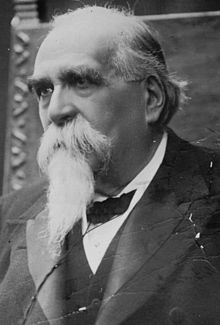
Back لويجي لوتساتي Arabic لويجى لوتساتى ARZ Luigi Luzzatti AST Luigi Luzzatti Czech Luigi Luzzatti German Luigi Luzzatti Spanish Luigi Luzzatti Basque لوئیجی لوتزاتی Persian Luigi Luzzatti Finnish Luigi Luzzatti French
Luigi Luzzatti | |
|---|---|
 | |
| Prime Minister of Italy | |
| In office 31 March 1910 – 30 March 1911 | |
| Monarch | Victor Emmanuel III |
| Preceded by | Sidney Sonnino |
| Succeeded by | Giovanni Giolitti |
| Minister of Treasury | |
| In office 14 March 1920 – 21 May 1921 | |
| Prime Minister | Francesco Saverio Nitti |
| Preceded by | Carlo Schanzer |
| Succeeded by | Carlo Schanzer |
| In office 8 February 1906 – 29 May 1906 | |
| Prime Minister | Sidney Sonnino |
| Preceded by | Paolo Carcano |
| Succeeded by | Angelo Majorana Calatabiano |
| In office 3 November 1903 – 27 March 1905 | |
| Prime Minister | Giovanni Giolitti Tommaso Tittoni |
| Preceded by | Ernesto Di Broglio |
| Succeeded by | Paolo Carcano |
| In office 11 July 1896 – 29 June 1898 | |
| Prime Minister | Antonio Starabba di Rudinì |
| Preceded by | Giuseppe Colombo |
| Succeeded by | Pietro Vacchelli |
| Minister of Agricolture, Industry and Trade | |
| In office 11 December 1909 – 31 March 1910 | |
| Prime Minister | Sidney Sonnino |
| Preceded by | Francesco Cocco-Ortu |
| Succeeded by | Giovanni Raineri |
| Personal details | |
| Born | 11 March 1841 Venice, Lombardy-Venetia, Austrian Empire |
| Died | 29 March 1927 (aged 86) Rome, Italy |
| Political party | Historical Right |
| Alma mater | University of Padua |
| Profession | |
Luigi Luzzatti (11 March 1841 – 29 March 1927) was an Italian financier, political economist, social philosopher, and jurist. He served as the 20th prime minister of Italy between 1910 and 1911.
Luzzatti came from a wealthy and cultured Jewish family and built a reputation as a social reformer dedicated to raise the working classes from ignorance and poverty.[1] He is remembered being the founder of the Italian credit union movement and for his book Dio nella libertà (God in Freedom), in which he advocates religious tolerance.[2] This provoked an exchange of correspondence between him and Benedetto Croce.
- ^ Soper, Building a Civil Society, p. 45
- ^ Luzzatti, Luigi. God in Freedom: Studies in the Relations Between Church And State.